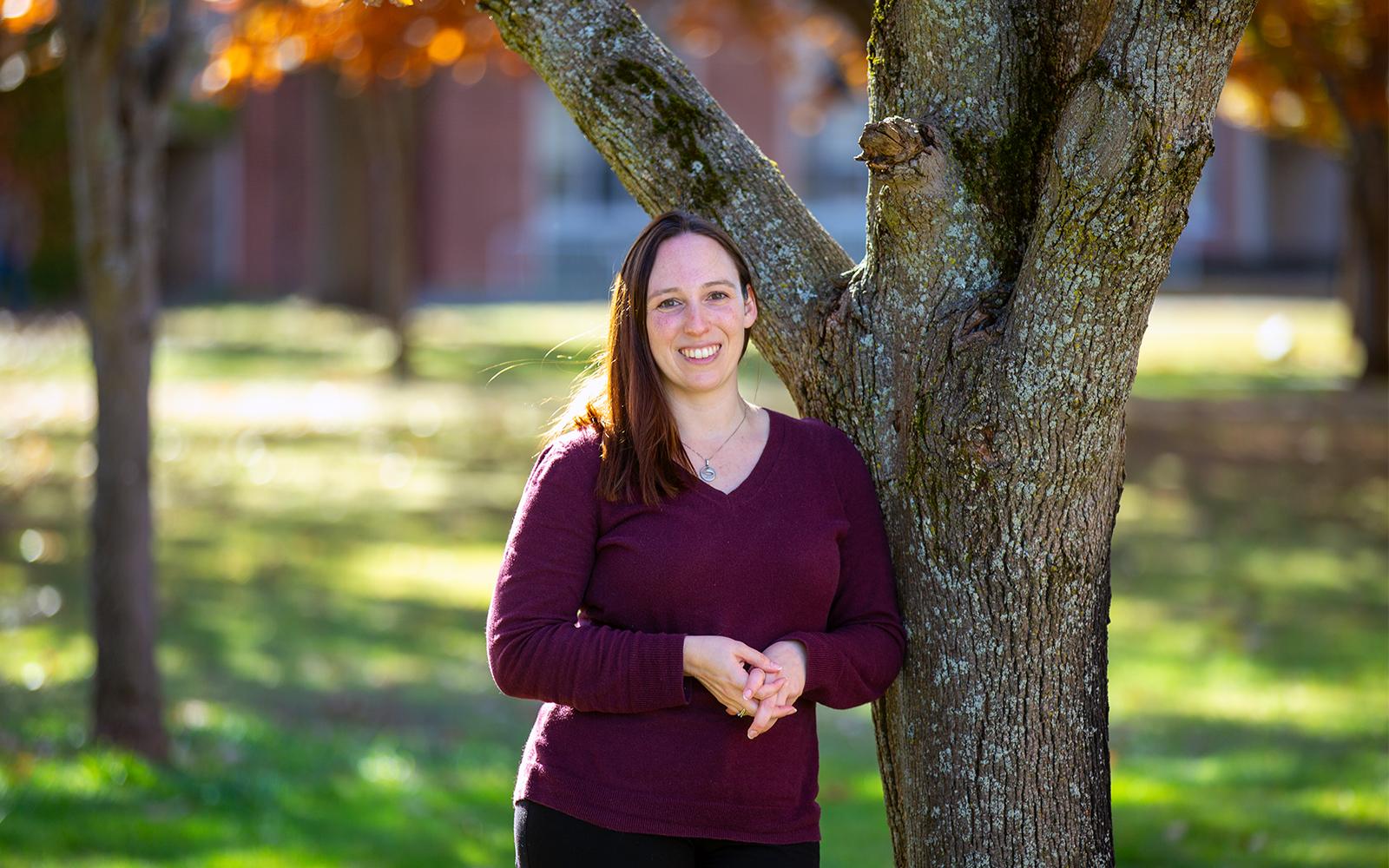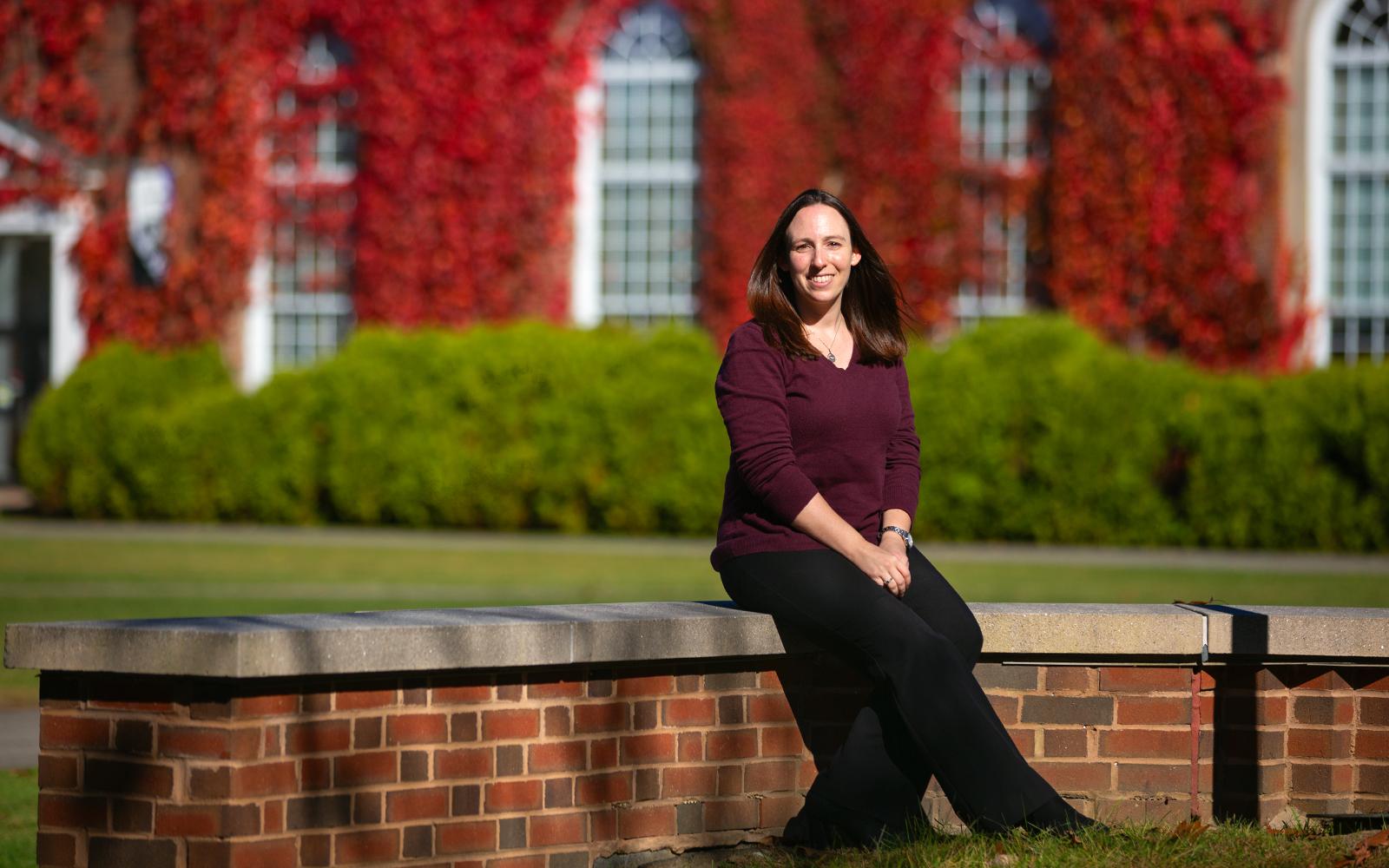As she fastens her silver necklace, Kate Favaro ’13 reflects on some of the most cherished memories of the good times spent with her grandmother throughout her youth.
“I wear it when I wake up and I miss her a little bit more. I grew up on Loon Lake, and she did too. She had given me this necklace before she started to fail. When she first died, I wore it every day as a habit because I wanted to feel that closeness, but it has much more meaning when I put it on now. Now in my job, I know I wear it on certain days because it has become a ritual,” Favaro said.

Since 2021, Favaro has worked as a Grief Services Coordinator for Hospice of St. Lawrence Valley where she draws on her personal experiences, and the experiences from her grandmother’s time in Hospice care, as she helps people deal with loss. In her role, Favaro offers one-on-one support to the primary caregivers of Hospice patients, from spouses and adult children to sisters and friends.
“I call them after the patient has died to offer support in a variety of ways and meet their grief needs. A big part of what I do is try to normalize grief and grief responses in the community. So, I write an article for North Country Now quarterly, which has been well received. It’s the best job I’ve ever had. No two days ever look the same,” Favaro said.
The SUNY Potsdam alumnus, who graduated with a degree in sociology in 2013, typically speaks with five to 10 clients per day about the death of a loved one, providing a calming and reassuring voice as they grapple with one of the most difficult events of their lives.
“Ninety percent of the people who suffer a loss are going to navigate their grief just fine with natural support. Ten percent might need a little extra support, and that’s where I come in” she said. “I function in my role as an educator, but also as someone who empowers people to grieve in a way that’s healthy and effective for them. I work on encouraging people to find ways to stay connected to the person who died.”
Favaro, who is certified in thanatology (the study of death, dying, and bereavement), is also involved in community outreach through Hospice’s “When Grief Comes to School” program, which is focused on normalizing feelings associated with death and dying. She offers an annual workshop to the local schools, and then in the event of a death in the education community, she provides administrative support and reviews their crisis plan. She also leads a Calling Hours 101 workshop for students and teachers at the schools.
“I had four teachers come last time who said, ‘Why isn’t this taught in health class?’ It goes through what you’re going to see and hear during calling hours, and we talk about what you should and shouldn’t say,” Favaro explained.
She has written two interactive grief journals, one for elementary children and one for middle and high school students, with another one in the works for adults. She regularly speaks with students at the four colleges in St. Lawrence County, including SUNY Potsdam, where she recently made a presentation in Mary Jones’ Death and Dying class about her role at Hospice.
Earlier in the Fall 2024 semester, she also visited her alma mater to speak with students in Dr. Heather Sullivan-Catlin’s Introduction to Sociology class where she discussed her transition from student to professional. “Heather asked me to talk about my career path and how I took my sociology degree, and my originally narrow view of what sociology majors could do for work, and explain how I went from cradle to grave, from foster care to hospice,” Favaro said.
Standing at the front of the class she shared her unique insight and knowledge from years of work for the Children's Home of Jefferson County, Transitional Living Services, and Hospice—career opportunities that began with her sociology classes at SUNY Potsdam.
“I took a scenic route. I came to Potsdam as a non-traditional student after transferring in with an associate’s degree from North Country Community College. I liked the sociology major. The classes and the formal education gave me the vocabulary and the foundational knowledge, but I think what was more impactful was knowing that if I needed something, I had professors who I could call,” she said.

Favaro discussed the impact of her internship at the St. Lawrence County Department of Social Services (DSS) in their foster care unit, where she supervised visits between parents and children who had been placed in foster care. The amazing hands-on experience paved the way for a full-time job right after graduation, as a Foster Care Case Planner at the Children's Home of Jefferson County.
“I was kind of the ringleader if you will. I worked directly with the birth parents, making sure they knew when visitations were happening, making sure they were getting referrals to in-patient rehab, mental health clinics, or support through Renewal House,” she explained. “And then I was working with the foster kiddos themselves, making sure they were doing ok emotionally. I visited them at the foster homes, I visited them at schools, and then I worked with the foster parents to help them support the kids and birth parents.”
One of the more unique aspects of her work during those first two years right out of school, was the opportunity to appear in court and share her observations with the judges and lawyers—helping to ensure children were being raised in a safe and supportive environment.
“I learned a lot about family law and how to testify in court. That was your chance to advocate for not just your kids, but the birth parents, because if the parents are doing what they need to do, then we want to reunify them. It was also your chance to advocate for the kids who had been freed for adoption and who were waiting for an adoption date,” she said.
From there, she transitioned to a case management position with Transitional Living Services for children diagnosed with serious emotional disturbances. In that role, she worked with families to support their children and keep them in the home rather than having them sent to juvenile detention or other alternatives. “That was an incredibly interesting job. I learned more about how the State mental health system works, and what it looks like to advocate for kids in that setting. And then I shifted to addiction recovery where I worked as a certified recovery peer advocate for a couple of years,” she said.
In 2021, two years after her grandmother had passed away, Favaro was immediately drawn to a job opening at Hospice. “I had already been trained to use my lived experience, and my formal education, to help people with shared experiences, so when I saw the posting for Hospice it just made sense,” she said.
Now, as a Grief Services Coordinator for Hospice, Favaro has found a job that fits perfectly with her sociology degree and life experiences, while making a positive impact in the community.
Back in the classroom at SUNY Potsdam, Favaro looks out over a sea of faces eager to learn more about the career opportunities for their sociology degrees. She continues to paint a picture of her own path while highlighting the breadth of options available.
“Career-wise, a lot of people have a very narrow idea of what sociology looks like. For me, sociology was social work, kids, the end. That’s not how that works. But I had worked with kids, and I had worked through the mentor program at SUNY Potsdam, so it really made sense in that progression. And I slowly learned that while kids are fantastic, they are not the demographic that I’m most effective with,” Favaro said.
As she continues to put her sociology degree to good use, in the same community where she completed her degree, Favaro said she has found the best job she’s ever had. Part of that is that the organization emphasizes the health and wellbeing of their employees, and provides them the flexibility to take time for themselves.
“I think self-care gets tossed around a lot and it's ‘hash-taggy,’ but it cannot be overstated. Especially if you’re a sociology major and chances are you’re going into a helping profession, you need to learn how to take care of yourself. That looks different for everybody, but finding an employer who allows you to take that time to take care of yourself is so important,” she said.
International travel has been Favaro’s best outlet to unwind and decompress when she’s out of the office. From Amsterdam to Thailand, she has been exploring the world in her free time. “I have a really great group of friends. We met in Europe in 2019 and I have traveled with them every single year since. We’re going to Morocco next year. I learned that the best way to take care of myself is usually to jump on an international flight and go somewhere,” she said.
Full of positive energy and a passion for helping others, Favaro continues to share her knowledge in the community and on college campuses around the region, as she tries to normalize the grieving process. “In my job, there’s a lot of emotion, and I have learned to pace myself,” she said. “The benefit to my job is that typically once we get past the first couple of sessions it’s a lot of stories about how great the person was, and how much they loved each other, and that’s incredibly amazing to witness.”
Article and photos by Jason Hunter
